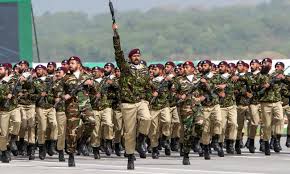Imran Khan recently survived a move by the opposition to oust him as Pakistan’s prime minister, getting a reprieve only when the deputy speaker NA blocked a no-confidence motion as unconstitutional, citing the involvement of ‘foreign conspiracy’. Subsequently, the opposition moved to challenge the block on the vote before the Supreme Court, while Imran Khan advised the
Imran Khan recently survived a move by the opposition to oust him as Pakistan’s prime minister, getting a reprieve only when the deputy speaker NA blocked a no-confidence motion as unconstitutional, citing the involvement of ‘foreign conspiracy’. Subsequently, the opposition moved to challenge the block on the vote before the Supreme Court, while Imran Khan advised the President of Pakistan to dissolve Parliament and called on the nation to prepare for fresh elections.
Chief Justice Umar Ata Bandial took suo motu notice of the situation and the matter went to the Supreme Court. A five-judge bench was formed by the Chief Justice for the hearing of dismissal of the no-confidence and the legality of dissolution of the NA.
Meanwhile, it was declared that PM Imran Khan will continue his duties under Clause 4 of Article 224A of the Constitution, which states that the incumbent Prime Minister shall continue to hold office till the appointment of the caretaker Prime Minister and fresh elections are held.
Subsequently, President Arif Alvi wrote a letter to Prime Minister Imran Khan and Leader of the Opposition in the outgoing National Assembly Shehbaz Sharif to propose the name of a suitable person for appointment as caretaker premier under Article 224(1A) of the Constitution. According to which, soon after the dissolution or expiration of the Assembly under Article 58, the President shall appoint a caretaker Cabinet, provided that the caretaker Prime Minister shall be selected by the President in consultation with the PM and the Leader of the Opposition in the outgoing NA.
Following the procedure, the name of Pakistan’s former Chief Justice Gulzar Ahmed was consulted by the President and the PM as the caretaker Prime Minister. However, Shehbaz Sharif refused to accept or propose a name for caretaker PM. He said that the matter was already in court, and he will not do anything “illegal” to the constitution or the honorable court. This step by the opposition leader does make sense because the outcome of whether there will be new elections, or the NA will resume depended upon the decision of the Court.
At this point in the debate, comes Article 224A, Clause 1 which states that in case the PM and the Leader of the Opposition in the outgoing NA do not agree on any person to be appointed as the care-taker PM within three days of the dissolution of the NA, they shall forward two nominees each to a Committee to be immediately constituted by the Speaker of the NA – comprising eight members of the outgoing NA (or the Senate, or both) having equal representation from the Treasury and the Opposition – to be nominated by the PM and the Leader of the Opposition respectively.
The Supreme Court, in the meantime, had adjourned a hearing into the legality of political maneuvers that led to the dissolution of the Parliament. So, President Arif Alvi instructed the Election Commission to finalize a date for new national polls under Clause 2 of the Article 224 A which states that, “a general election to the Assembly shall be held within ninety days after the dissolution, and the results of the election shall be declared not later than fourteen days after the conclusion of the polls.”
In response to this, the Chief Election Commissioner said that seven months until October are required to hold free, fair, and transparent polls in the country. The ECP needed four months to complete the delimitations, in addition, to organizing general elections in 90 days.
This political and constitutional uncertainty, however, ended on 7 April 2022 when the decision of the Supreme Court came. The decision ruled that Prime Minister Imran Khan’s move to dissolve parliament and call for early elections was illegal. Further, the SC has ordered the National Assembly to reconvene and hold a no-confidence vote that could lead to Khan’s removal from office.
- Article 224: Caretaker Government Process Explained - April 14, 2022
- What is Article 69? – Relevant Case Law and Analysis - April 6, 2022
- Comprehensive Maritime Strategic Aspects in the view of National Security Policy - March 28, 2022





















Leave a Comment
Your email address will not be published. Required fields are marked with *